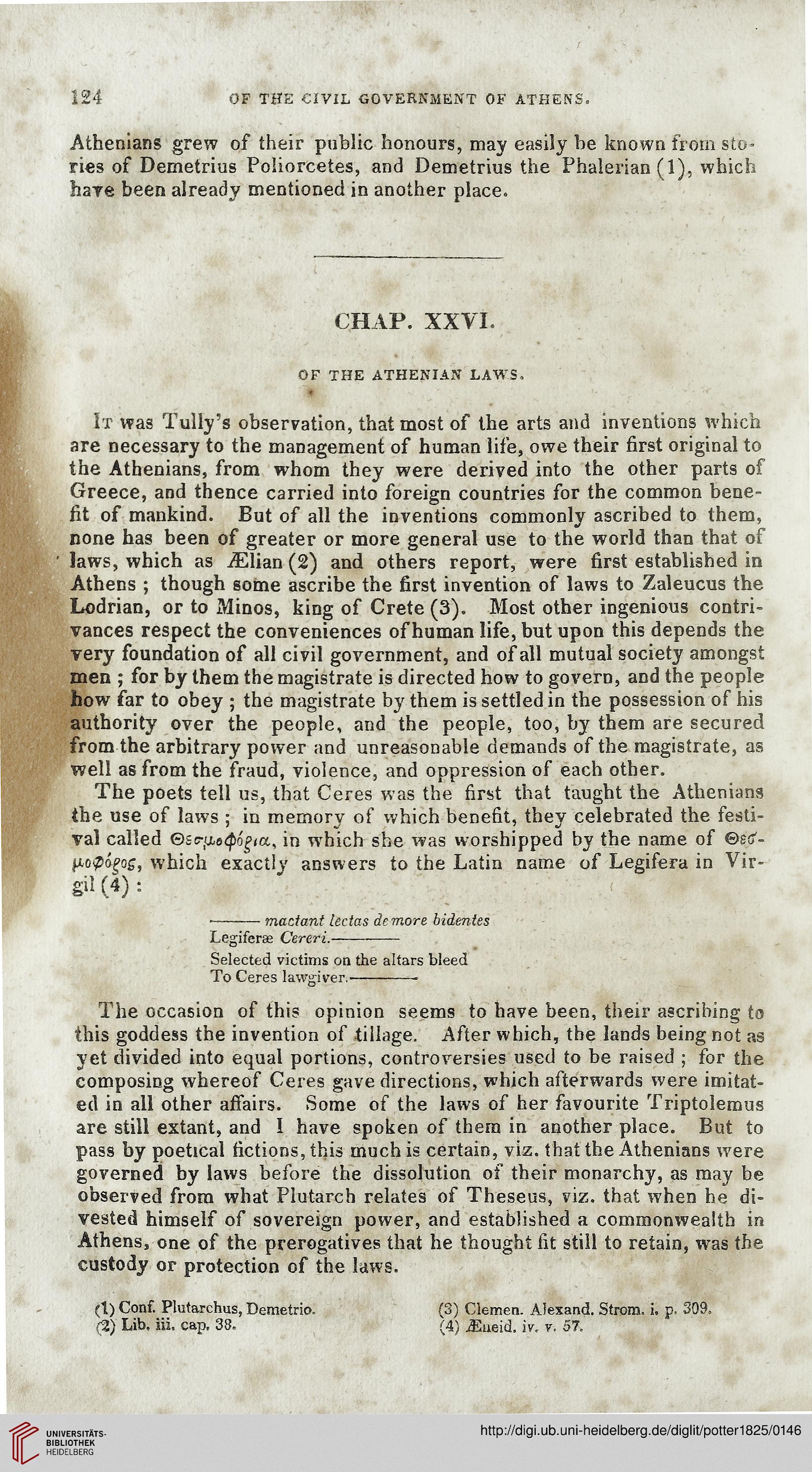124
of the civil government of athens.
Athenians grew of their public honours, may easily be known from sto-
ries of Demetrius Poliorcetes, and Demetrius the Phalerian (1), which
hare been already mentioned in another place.
CHAP. XXVI.
of the athenian law's.
It wa3 Tully's observation, that most of the arts and inventions which
are necessary to the management of human life, owe their first original to
the Athenians, from whom they were derived into the other parts of
Greece, and thence carried into foreign countries for the common bene-
fit of mankind. But of all the inventions commonly ascribed to them,
none has been of greater or more general use to the world than that of
laws, which as iElian (2) and others report, were first established in
Athens ; though some ascribe the first invention of laws to Zaleucus the
Lodrian, or to Minos, king of Crete (3). Most other ingenious contri-
vances respect the conveniences of human life, but upon this depends the
very foundation of all civil government, and of all mutual society amongst
men ; for by them the magistrate is directed how to govern, and the people
how far to obey ; the magistrate by them is settled in the possession of his
authority over the people, and the people, too, by them are secured
from the arbitrary power and unreasonable demands of the magistrate, as
well as from the fraud, violence, and oppression of each other.
The poets tell us, that Ceres was the first that taught the Athenians
the use of laws ; in memory of which benefit, they celebrated the festi-
val called ©tras^ia, in which she was worshipped by the name of €>e<i-
fto£a£o£, which exactly answers to the Latin name of Legifera in Vir-
gil (4) :
■-mactant lectas demore bidentes
Legiferae Cereri.————
Selected victims on the altars bleed
To Ceres lawgiver.-■
The occasion of this opinion seems to have been, their ascribing to
this goddess the invention of tillage. After which, the lands being not as
yet divided into equal portions, controversies used to be raised ; for the
composing whereof Ceres gave directions, which afterwards were imitat-
ed in all other affairs. Some of the laws of her favourite Triptolemus
are still extant, and I have spoken of them in another place. But to
pass by poetical fictions, this much is certain, viz. that the Athenians were
governed by laws before the dissolution of their monarchy, as may be
observed from what Plutarch relates of Theseus, viz. that when he di-
vested himself of sovereign power, and established a commonwealth in
Athens, one of the prerogatives that he thought fit still to retain, was the
custody or protection of the laws.
(1) Conf. Plutarchus, Demetrio.
(i) Lib. iii. cap. 38.
(3) Clemen. Alexand. Strom, i. p. 309.
(4) JSiieid. iv, v. 57,
of the civil government of athens.
Athenians grew of their public honours, may easily be known from sto-
ries of Demetrius Poliorcetes, and Demetrius the Phalerian (1), which
hare been already mentioned in another place.
CHAP. XXVI.
of the athenian law's.
It wa3 Tully's observation, that most of the arts and inventions which
are necessary to the management of human life, owe their first original to
the Athenians, from whom they were derived into the other parts of
Greece, and thence carried into foreign countries for the common bene-
fit of mankind. But of all the inventions commonly ascribed to them,
none has been of greater or more general use to the world than that of
laws, which as iElian (2) and others report, were first established in
Athens ; though some ascribe the first invention of laws to Zaleucus the
Lodrian, or to Minos, king of Crete (3). Most other ingenious contri-
vances respect the conveniences of human life, but upon this depends the
very foundation of all civil government, and of all mutual society amongst
men ; for by them the magistrate is directed how to govern, and the people
how far to obey ; the magistrate by them is settled in the possession of his
authority over the people, and the people, too, by them are secured
from the arbitrary power and unreasonable demands of the magistrate, as
well as from the fraud, violence, and oppression of each other.
The poets tell us, that Ceres was the first that taught the Athenians
the use of laws ; in memory of which benefit, they celebrated the festi-
val called ©tras^ia, in which she was worshipped by the name of €>e<i-
fto£a£o£, which exactly answers to the Latin name of Legifera in Vir-
gil (4) :
■-mactant lectas demore bidentes
Legiferae Cereri.————
Selected victims on the altars bleed
To Ceres lawgiver.-■
The occasion of this opinion seems to have been, their ascribing to
this goddess the invention of tillage. After which, the lands being not as
yet divided into equal portions, controversies used to be raised ; for the
composing whereof Ceres gave directions, which afterwards were imitat-
ed in all other affairs. Some of the laws of her favourite Triptolemus
are still extant, and I have spoken of them in another place. But to
pass by poetical fictions, this much is certain, viz. that the Athenians were
governed by laws before the dissolution of their monarchy, as may be
observed from what Plutarch relates of Theseus, viz. that when he di-
vested himself of sovereign power, and established a commonwealth in
Athens, one of the prerogatives that he thought fit still to retain, was the
custody or protection of the laws.
(1) Conf. Plutarchus, Demetrio.
(i) Lib. iii. cap. 38.
(3) Clemen. Alexand. Strom, i. p. 309.
(4) JSiieid. iv, v. 57,





